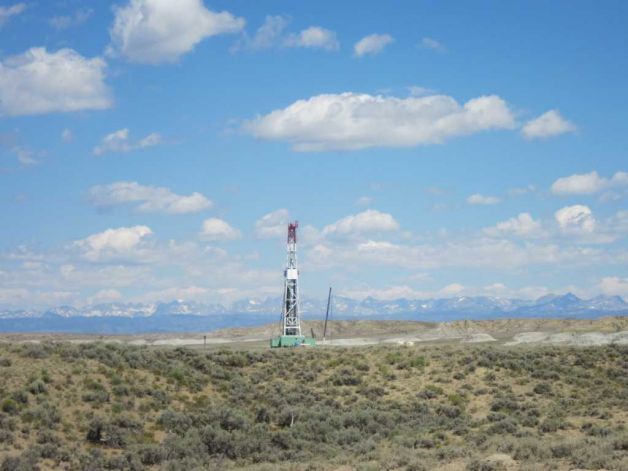The U.S. Environmental Protection Agency is fending off criticism after issuing a draft report claiming it has found chemicals consistent with hydraulic fracturing in groundwater in Wyoming. Non-EPA analysts have criticized the agency for exercising poor quality control of its water samples, overlooking that many activities other than hydraulic fracturing could be the source of the common chemicals reported by EPA, and ignoring evidence several water tests closer to hydraulic fracturing sites than EPA’s disputed samples reveal no chemical contamination.
Trace Chemicals Reported
The 121-page EPA study addresses allegations of groundwater contamination in Pavilion, Wyoming, in the vicinity of natural gas production sites operated by Encana Corp.
In its report, EPA alleges fracking—the use of water, sand, and chemicals to dislodge gas from shale—is the likely cause of trace elements of pollutants found in local groundwater. According to EPA, “methane, other hydrocarbons, and other chemical compounds” have made their way into a local aquifer, and the agency reports it suspects fracking is the culprit.
Senators Question Report
Ten U.S. senators responded by sending a letter to EPA administrator Lisa Jackson arguing EPA must subject its procedures and conclusions to “the most rigorous, independent and thorough external peer review process.”
“We ask that the agency fully address the problems that have been identified by the State of Wyoming and others, including data gaps and the timing and process of all evaluations, reviews, and conclusions prior to initiating the peer review process,” states the senators’ letter.
The stakes are high, the senators note.
“Natural gas development is estimated to contribute hundreds of billions of dollars to the United States economy, and hydraulic fracturing is estimated to be used in almost 90% of gas wells drilled today,” the letter notes. “Any assessment linking hydraulic fracturing with drinking water contamination will have a clear economic impact on the natural gas development industry, natural gas users, and other economic sectors. Additionally, given the extensive media involvement initiated by EPA, it appears that the methods developed in the report could form the basis for national testing and monitoring and result in compliance requirements for virtually every well.
“The draft report’s supposition that the groundwater contamination contains compounds associated with gas production, including hydraulic fracturing, is the first time that a federal agency has posed a connection between hydraulic fracturing and groundwater contamination … and its testing methodologies and the quantity of data collected have been called into question by Wyoming state officials, industry experts, and others,” the letter observes.
EPA Continues Investigation
EPA is expected to release a final report on the Pavilion groundwater samples later this year. Separately, EPA is monitoring ongoing fracking operations in Louisiana and Pennsylvania and is reviewing fracking operations in North Dakota, Colorado, and elsewhere.
Currently, states, and not EPA, regulate fracking within their borders, and officials in states where fracking is taking place don’t want to relinquish that authority. They note geology and hydrology differ from state to state and within each state, and therefore, they say, a national one-size-fits-all regulatory structure would do more harm than good.
‘Unscientific Anti-Fossil Fuel Campaign’
At stake is nothing less than the future of what has been called the “shale revolution.” Energy production made possible by oil and natural gas finds in shale rock formations is raising living standards and slashing unemployment rates in areas where shale oil and gas are being extracted through hydraulic fracturing and horizontal drilling.
Hydraulic fracturing in the Bakken shale formation underneath North Dakota, for example, has lowered the state’s unemployment rate to a mere 3.4 percent and is creating jobs paying more than $100,000 per year for recent high school graduates.
“EPA’s Wyoming water study is not really about water or public health. The agenda-driven conclusions are part of the Obama administration’s unscientific anti-fossil fuel campaign,” said Marita Noon, executive director of the New Mexico-based Citizens Alliance for Responsible Energy.
“If the current administration can ban the use of fracking for oil and gas extraction, they will deliver a near-fatal blow to the domestic energy boom sweeping across those areas of the country where shale gas and oil are abundant,” said Noon. “The shale revolution has been made possible by geology and advances in technology, especially hydraulic fracturing and horizontal drilling. As a result, natural gas prices in the United States are falling, threatening the viability of taxpayer-subsidized wind and solar power.”
Bonner R. Cohen, Ph. D. ([email protected]) is a senior fellow at the National Center for Public Policy Research.
Internet Info:
“EPA Releases Draft Findings of Pavillion, Wyoming Ground Water Investigation for Public Comment and Independent Scientific Review,” U.S. Environmental Protection Agency, Dec. 8, 2011: http://yosemite.epa.gov/opa/admpress.nsf/20ed1dfa1751192c8525735900400c30/ef35bd26a80d6ce3852579600065c94e!OpenDocument





